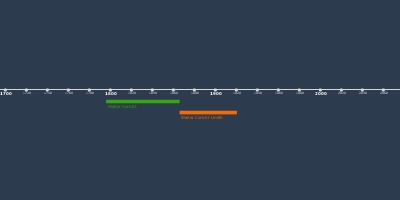31 out 1772 ano - 1773 Escalation
Descrição:
1773 - Setting the stage for the Boston Tea PartyBritish tea sales in the Colonies have dropped 70% since passage of the Townshend Acts three years earlier.
In May, the British Parliament passes the Tea Act in an ill-fated attempt to prop up the financially struggling British East India Company, which has 18 million pounds of unsold tea sitting in its warehouses.
Although the Tea Act actually reduces the tax on tea, it creates a monopoly by forcing the Colonists to buy only from the East India Company.
Why is this a problem? Easy - the East India Company ships directly from India, by-passing London merchants with whom the Colonists have trade agreements.
Furthermore, the Tea Act stipulates that the tea can be sold in the colonies only by British-selected agents in the colonies, further cutting into the profits of local colonial merchants.
Did the British think that lowering the tariff would cause the colonists to overlook the other provisions? If so, they thought wrong!
So was the real issue taxes? Not really...the Tea Act would have lowered taxes. No, the real issue was the Colonists' profits, which the Tea Act would have reduced.
In September, British ships carrying 500,000 tons of tea depart from England for the colonies.
TeapotTo the Colonists, the tea tax represents a test.
They tell themselves that if they pay it, they'll confirm Britain's right to tax them - of course, the British have already been taxing them, but of course the real "cost" to the Colonists is loss of free trade.
Because the English government declared that tax will be owned the moment that the Colonists unload the tea onto the docks, they resolve that the tea must not be unloaded.
The British, an ocean away and out of touch with the mood in the colonies, imagine that the Tea Act will be received warmly by colonists. Since they don't question their right to tax the colonists, they don't realize the strength of the colonists' feelings about taxation by a distant power. Perhaps not realizing how much smuggling has been going on, the British even imagine that the colonists will be happy to have their tea supply restored.
As a result, the heat of the colonists’ anger catches them off-guard.
“Anger” is an understatement.
In Philadelphia and New York, colonists send the tea ships back to London. In Annapolis, an incensed crowd forces the ship’s frightened captain to burn his cargo and his ship. But in Boston, British Governor Thomas Hutchinson decides to stand firm.
The first tea ship, the Dartmouth, arrives in Boston on November 28th carrying a load of Darjeeling. Two more ships quickly follow.
Photo of Old South Meeting House on Boston's Freedom TrailIn a public show of defiance against the British authorities, Samuel Adams and other Bostonians prevent the tea - 60 tons all together - from being unloaded.
In an equally public show of non-capitulation against the rebellious Colonists, Hutchinson, who happens to be related to the local British-appointed tea agents, keeps the ships in Boston Harbor and insists that the cargo will be brought ashore and taxed.
During the 3 weeks leading up to December 16, colonists meet almost daily in the Old South Meeting House (now a museum on Boston's Freedom Trail) to try to find or negotiate a legal way to not pay the tax.
The Colonists formally approve a resolution requesting that the local British-appointed tea agents refuse delivery of the tea and send the ships back to England. The tea agents - including Governor Hutchinson's relatives - refuse.
Adicionado na linha do tempo:
Data:
31 out 1772 ano
Agora
~ 253 years ago
